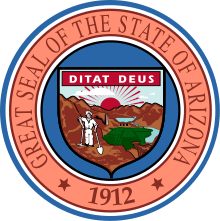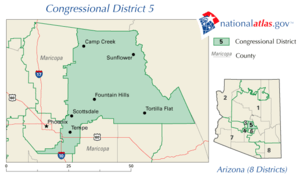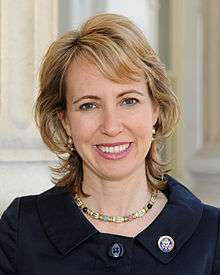United States House of Representatives elections in Arizona, 2010
| | ||||||||||||||||||||||||||||||||||||||
| ||||||||||||||||||||||||||||||||||||||
| ||||||||||||||||||||||||||||||||||||||
|
| ||||||||||||||||||||||||||||||||||||||
| 2010 election results by district Democratic hold Democratic gain Republican hold Republican gain | ||||||||||||||||||||||||||||||||||||||
| Elections in Arizona | ||||||||
|---|---|---|---|---|---|---|---|---|
 | ||||||||
|
||||||||
|
||||||||
The 2010 congressional elections in Arizona was held on November 2, 2010, to determine who will represent the state of Arizona in the United States House of Representatives. Arizona has eight seats in the House, apportioned according to the 2000 United States Census. Representatives are elected for two-year terms; those elected will serve in the 112th Congress from January 3, 2011 until January 3, 2013.
The state's 2009-2010 delegation consisted of five Democrats and three Republicans. With the exception of Democrat Ann Kirkpatrick, who had won the open seat in District 1 during the previous election, all members of the delegation were incumbents who had served for at least a full term in Congress. Also, with the exception of retiring Republican John Shadegg of District 3, all incumbent members of the state's delegation ran for re-election.
As of August 17, 2010, Districts 1, 5 and 8, all currently held by Democrats, were considered to be competitive by both CQ Politics and The Cook Political Report.[1][2] The primary elections for Congressional races were held on August 24, 2010.[3]
Overview
The table below shows the total number and percentage of votes, as well as the number of seats gained and lost by each political party in the election for the United States House of Representatives in Arizona. In addition, the voter turnout and the number of votes not valid will be listed below.
| United States House of Representatives elections in Arizona, 2010[4] | |||||
|---|---|---|---|---|---|
| Party | Votes | Percentage | Seats | +/– | |
| Republican | 900,510 | 53.03% | 5 | +2 | |
| Democratic | 711,837 | 41.92% | 3 | -2 | |
| Libertarian | 72,216 | 4.25% | 0 | 0 | |
| Green | 9,066 | 0.53% | 0 | 0 | |
| Independent | 4,506 | 0.27% | 0 | +/-0 | |
| Totals | 1,698,135 | 100% | 8 | — | |
| Voter turnout | 55.7% | ||||
District 1
Democratic incumbent Ann Kirkpatrick ran for reelection, challenged by Republican nominee Paul Gosar and Libertarian nominee Nicole Patti (PVS).
Kirkpatrick and Patti ran unopposed in their respective primaries. The Republican primary featured 8 candidates seeking to take on Kirkpatrick in the general election. Mining industry lobbyist Sydney Hay, who had been the Republican nominee to run against Kirkpatrick in 2008, finished second in the primary behind dentist Paul Gosar. Gosar, a political neophyte, was buoyed by endorsements from highly visible Republican politicians, including Sarah Palin.[5] Other unsuccessful Republican candidates included attorney Bradley Beauchamp and former state legislator Rusty Bowers. District 1 was represented by Kirkpatrick since 2009. Prior to her election in 2008, the district had been held by Republicans since 1995. Kirkpatrick lost on November 2, 2010 to Paul Gosar and the seat reverted to the Republicans.
| Party | Candidate | Votes | % | |
|---|---|---|---|---|
| Republican | Paul Gosar | 112,816 | 49.7 | |
| Democratic | Ann Kirkpatrick (incumbent) | 99,233 | 43.7 | |
| Libertarian | Nicole Patti | 14,869 | 6.6 | |
- Race ranking and details from CQ Politics
- Campaign contributions from OpenSecrets.org
- Race profile at The New York Times
Polling
| Poll Source | Dates Administered | Ann Kirkpatrick (D) | Paul Gosar (R) |
|---|---|---|---|
| Lake Research Partners | October 12–14, 2010 | 41% | 38% |
| The Hill/ANGA poll | September 25–30, 2010 | 39% | 46% |
| Moore Information | August 30–31, 2010 | 43% | 43% |
| American Action Forum | August 25–29, 2010 | 41% | 47% |
| Lake Research Partners | August 24–26, 2010 | 43% | 39% |
District 2
Republican incumbent Trent Franks was challenged by Democratic nominee John Thrasher (campaign site, PVS), and Libertarian nominee Powell Gammill (campaign site, PVS).
District 2 has been represented by Republican Trent Franks since 2003. He was challenged by US Army veteran and contractor Charles Black, a political upstart, in the Republican primary. Franks won an easy victory with over 80% of the vote in his favor.[6]
Retired teacher John Thrasher ran unopposed for the Democratic nomination. Thrasher has twice attempted to unseat Franks, losing to the incumbent by 19% in 2006 and by 22% in 2008. Retired biologist Powell Gammill ran unopposed for the Libertarian nomination. Gammill had run unsuccessfully for the seat in 2008, taking in just over 2% of the vote.
Trent Franks won re-election on November 2, 2010.
| Party | Candidate | Votes | % | |
|---|---|---|---|---|
| Republican | Trent Franks (incumbent) | 173,173 | 64.9 | |
| Democratic | John Thrasher | 82,891 | 31.0 | |
| Libertarian | Powell Gammill | 10,820 | 4.1 | |
- Race ranking and details from CQ Politics
- Campaign contributions from OpenSecrets.org
- Race profile at The New York Times
District 3
This is an open seat, as Republican incumbent John Shadegg is retiring. Candidates are Republican nominee Ben Quayle, Democratic nominee Jon Hulburd, Libertarian nominee Michael Shoen (campaign site, PVS), and Green Party nominee Leonard Clark (campaign site, PVS).
On January 14, 2010 8-term incumbent Shadegg announced his retirement at the end of his current term, making the third district an open seat.[7]
In the wake of Shadegg's retirement, several Republicans declared their candidacy, including state legislators Pamela Gorman, Jim Waring and Sam Crump, Paradise Valley mayor Vernon Parker and former mayor Ed Winkler, and attorneys Paulina Morris and Ben Quayle.[8][9][10][11] Quayle, the son of former Vice President Dan Quayle, emerged victorious with 22.8% of the vote, while businessman and political neophyte Steve Moak came in second with 18%.[6]
Attorney and small businessman Jon Hulburd filed his candidacy for the Democratic nomination on October 16, 2009.[12] The Hulburd campaign got off to a strong start and raised over $300,000 in the fourth quarter of 2009.[13] This attracted national attention with the DCCC naming the race as one of its top 17 races to watch nationwide.[14] Hulburd was not opposed in the primary.
Attorney Michael Shoen ran unopposed for the Libertarian nomination. Shoen had run for the seat in 2008, earning just under 4% of the vote. Iraq War veteran Leonard Clark won the Green Party nomination.[15][16][17]
Ben Quayle won the general election on November 2, 2010.
| Party | Candidate | Votes | % | |
|---|---|---|---|---|
| Republican | Ben Quayle | 108,689 | 52.2 | |
| Democratic | Jon Hulburd | 85,610 | 41.1 | |
| Libertarian | Michael Shoen | 10,478 | 5.0 | |
| Green | Leonard Clark | 3,294 | 1.6 | |
- Race ranking and details from CQ Politics
- Campaign contributions from OpenSecrets.org
- Race profile at The New York Times
Polling
| Poll Source | Dates Administered | Ben Qualye (R) | Jon Hulburd (D) |
|---|---|---|---|
| Public Policy Polling | October 16–17, 2010 | 44% | 46% |
District 4
Democratic incumbent Ed Pastor is running for reelection, challenged by Republican nominee businesswoman Janet Contreras (campaign site, PVS), Libertarian Party nominee accountant Rebecca DeWitt (campaign site, PVS), and Green Party nominee retired economist Joe Cobb (campaign site, PVS).
District 4 has been represented by Pastor since 1991. Since taking office, he has been re-elected nine times with no less than 62% of the vote. He ran unopposed in his primary. Contreras defeated immigration attorney Joe Peñalosa for the Republican nomination by a margin of 59-40%.[6] DeWitt and Cobb ran unopposed in their respective primaries. Both had run unsuccessfully for the seat in 2008, with DeWitt taking 3.5% of the vote, while Cobb had earned 3%.
Ed Pastor won re-election on November 2, 2010.
| Party | Candidate | Votes | % | |
|---|---|---|---|---|
| Democratic | Ed Pastor (incumbent) | 61,524 | 66.8 | |
| Republican | Janet Contreras | 25,300 | 27.5 | |
| Libertarian | Joe Cobb | 2,718 | 3.0 | |
| Green | Rebecca DeWitt | 2,365 | 2.6 | |
- Race ranking and details from CQ Politics
- Campaign contributions from OpenSecrets.org
- Race profile at The New York Times
District 5

Democratic incumbent Harry Mitchell ran for reelection, challenged by Republican nominee David Schweikert and Libertarian nominee Nick Coons (campaign site, PVS).
Mitchell and Coons ran unopposed in their respective primaries. In the Republican primary, former Maricopa County treasurer David Schweikert defeated businessman and political newcomer Jim Ward, and former Scottsdale city council member Susan Bitter Smith, who he had defeated in the 2008 primary election, as well as 3 other candidates. Schweikert's victory sets up a rematch against Mitchell, who defeated him 53-44% in the 2008 general election.[18] Ryan Blackman was the Green Party nominee, but he withdrew.[19] District 5 has been represented by Mitchell since 2007. Prior to Mitchell's victory over incumbent conservative Republican J.D. Hayworth, the district had been held by Republicans since 1985. David Schweikert defeated Democratic incumbent Harry Mitchell on November 2, 2010, returning the seat to the Republicans.
| Party | Candidate | Votes | % | |
|---|---|---|---|---|
| Republican | David Schweikert | 110,374 | 52.0 | |
| Democratic | Harry Mitchell (incumbent) | 91,749 | 43.2 | |
| Libertarian | Nick Coons | 10,127 | 4.8 | |
- Race ranking and details from CQ Politics
- Campaign contributions from OpenSecrets.org
- Race profile at The New York Times
Polling
| Poll Source | Dates Administered | Harry Mitchell (D) | David Schweikert (R) |
|---|---|---|---|
| The Hill/ANGA | October 12–14, 2010 | 42% | 45% |
| Benenson Strategy Group | October 5–7, 2010 | 46% | 39% |
| National Research | October 5–6, 2010 | 43% | 45% |
| Bennett, Petts & Normington | September 26–27, 2010 | 43% | 40% |
| Harstad Strategic Research | September 13–16, 2010 | 45% | 44% |
| National Research | August 31-September 2, 2010 | 38% | 46% |
| American Action Forum | August 25–29, 2010 | 44% | 50% |
District 6
Republican incumbent Jeff Flake was challenged by Democratic nominee librarian Rebecca Schneider (campaign site, PVS), Libertarian nominee Darell Tapp (PVS), and Green Party nominee Richard Grayson (campaign site).
In the Republican primary, Flake defeated Jeff Smith, an investor, by 65-35%. In the Democratic primary, librarian Rebecca Schneider ran unopposed. Schneider ran against Flake in the 2008 election cycle, losing 62-35%. District 6 has been represented by Flake since 2001. Flake won re-election on November 2, 2010.
| Party | Candidate | Votes | % | |
|---|---|---|---|---|
| Republican | Jeff Flake (incumbent) | 165,649 | 66.3 | |
| Democratic | Rebecca Schneider | 72,615 | 29.1 | |
| Libertarian | Darell Tapp | 7,712 | 3.1 | |
| Green | Richard Grayson | 3,407 | 1.4 | |
- Race ranking and details from CQ Politics
- Campaign contributions from OpenSecrets.org
- Race profile at The New York Times
District 7
Democratic incumbent Raúl Grijalva was challenged by Republican nominee physicist Ruth McClung (campaign site, PVS), Libertarian banker George Keane (campaign site, PVS), and Independent high school teacher Harley Meyer (campaign site, PVS).
In the Democratic primary, Grijalva ran unopposed. In the Republican primary, McClung won with just over 50% of the vote in a field of 5 candidates.[6] In the Libertarian primary, Keane won against Andrew Ibarra 54% to 39%.[6] District 7 has been represented by Grijalva since it was created in 2003. Grijalva won re-election on November 2, 2010.
| Party | Candidate | Votes | % | |
|---|---|---|---|---|
| Democratic | Raúl Grijalva (incumbent) | 79,935 | 50.2 | |
| Republican | Ruth McClung | 70,385 | 44.2 | |
| Independent | Harley Meyer [16] | 4,506 | 2.8 | |
| Libertarian | George Keane | 4,318 | 2.7 | |
- Race ranking and details from CQ Politics
- Campaign contributions from OpenSecrets.org
- Race profile at The New York Times
Polling
| Poll Source | Dates Administered | Raúl Grijalva (D) | Ruth McClung (R) | Undecided |
|---|---|---|---|---|
| Summit Consulting Group | October 4–5, 2010 | 37% | 39% | 24% |
| Magellan Strategies | September 29, 2010 | 40% | 38% | 13% |
| American Political Consultants | September 25–26, 2010 | 42% | 35% | 23% |
District 8
Democratic incumbent Gabrielle Giffords won her race for reelection, after a challenge from Republican nominee Marine veteran and businessman Jesse Kelly and Libertarian nominee engineer Steven Stoltz (campaign site, PVS).
In the Republican primary, Kelly defeated former State Senator Jonathan Paton 49-41%, with 2 other candidates picking up the remainder of the vote. Giffords and Stoltz ran unopposed in their respective primaries. District 8 has been represented by Giffords since 2007. Prior to her win, the seat had been held by Republicans since the creation of the district in 2003. Giffords' re-election allows the seat to be retained by the Democrats.
 (Won Reelection)
(Won Reelection)
| Party | Candidate | Votes | % | ± | |
|---|---|---|---|---|---|
| Democratic | Gabrielle Dee Giffords (Incumbent) | 138,280 | 48.76% | ||
| Republican | Jesse Kelly | 134,124 | 47.30% | ||
| Libertarian | Steven Stoltz | 11,174 | 3.94% | ||
| Majority | 4,156 | 1.46% | |||
| Total votes | 283,578 | 100.00 | |||
| Democratic hold | |||||
- Race ranking and details from CQ Politics
- Campaign contributions from OpenSecrets.org
- Race profile at The New York Times
Polling
| Poll Source | Dates Administered | Gabrielle Giffords (D) | Jesse Kelly (R) |
|---|---|---|---|
| American Action Forum | August 25–29, 2010 | 46% | 46% |
References
- ↑ "Race Ratings Chart: House". CQ Politics. Archived from the original on October 28, 2010. Retrieved 2010-08-26.
- ↑ "2010 COMPETITIVE HOUSE RACE CHART". The Cook Political Report. 2010-08-17. Retrieved 2010-08-26.
- ↑ "2010 Primary Election". Arizona Secretary of State.
- ↑ "State of Arizona Official Canvass - 2010" (PDF). Archived from the original (PDF) on September 20, 2013.
- ↑ LaMaster, Lynne (2010-08-26). "Paul Gosar Finds Easy Victory in CD1 Primary". Prescott News. Retrieved 2010-08-26.
- 1 2 3 4 5 "August 24, 2010 Primary Election". Arizona Secretary of State. Retrieved 2010-08-26.
- ↑ Nowicki, Dan (January 15, 2010). "Arizona Rep. John Shadegg wonít seek re-election". The Arizona Republic.
- ↑ "Shadegg move sets off a political tidal-wave". The Arizona Republic. January 20, 2010.
- ↑ Balazs, Diana (January 29, 2010). "Another Paradise Valley mayor eyes John Shadegg's seat in Congress". The Arizona Republic.
- ↑ "Paulina Vazquez Morris for US Congress". Latino Perspectives Magazine. February 2010.
- ↑ Kraushaar, Josh (February 12, 2010). "Quayle's son running for Shadegg seat". The Politico.
- ↑ "Federal Election Commission Report". Retrieved January 27, 2010.
- ↑ Blake, Aaron (January 14, 2010). "Dem running for Shadegg's seat is well-funded". The Hill.
- ↑ Kraushaar, Josh (January 14, 2010). "DCCC telegraphs its top GOP targets". The Politico.
- ↑ Official candidate list Arizona Secretary of State
- 1 2 "Full Listing". Azsos.gov. Retrieved 2010-09-04.
- ↑ "Press Release: Arizona Green Party (AZGP) endorses seven candidates at state meeting | Arizona Green Party". AZGP. Retrieved 2010-09-04.
- ↑ "Campaign". TheHill.com. 2009-11-17. Retrieved 2010-08-21.
- ↑ Official candidate listing] Arizona Secretary of State
External links
- Elections at the Arizona Secretary of State
- U.S. Congress candidates for Arizona at Project Vote Smart
- Arizona U.S. House from OurCampaigns.com
- Campaign contributions for U.S. Congressional races in Arizona from OpenSecrets.org
- 2010 Arizona General Election graph of multiple polls from Pollster.com
- House - Arizona from the Cook Political Report
